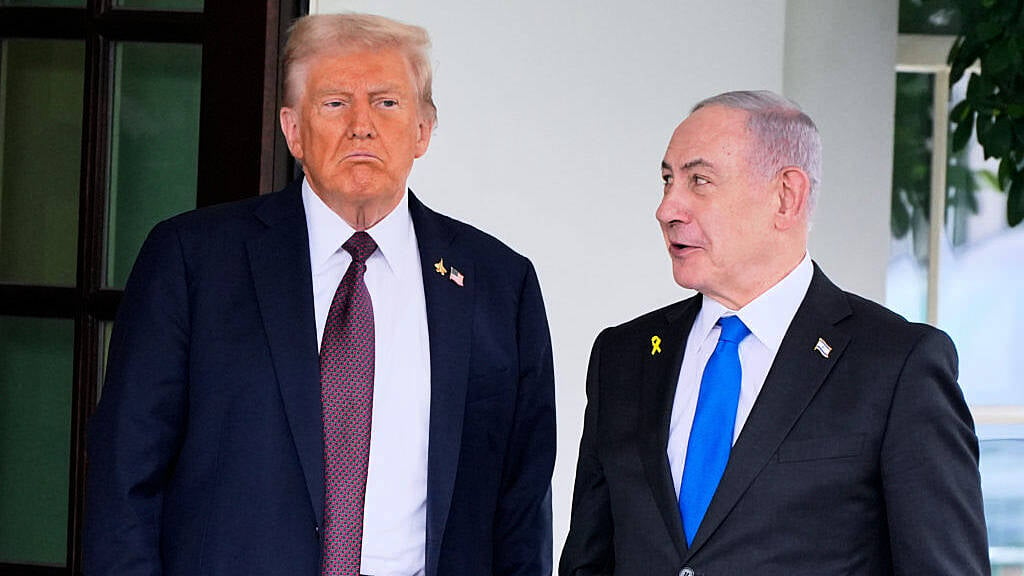US President Donald Trump is hosting Israeli Prime Minister Benjamin Netanyahu for critical talks aimed at ending the war in Gaza and developing a U.S. plan for post-war governance in the Palestinian territory.
The White House talks come at a tenuous moment. Israel is increasingly isolated, losing support from many countries that were long its steadfast allies. At home, Mr. Netanyahu’s governing coalition appears more fragile than ever. Meanwhile, the White House is showing signs of impatience.
The question now is whether Mr. Trump, who has offered steadfast backing to Mr. Netanyahu throughout the war, will change his tone and turn up the pressure on Israel to wind down the conflict. As he welcomed Mr. Netanyahu to the White House, Mr. Trump responded affirmatively when asked by reporters whether he was confident a deal would soon be reached to end the fighting between Israel and Hamas.
“I am. I’m very confident,” Mr. Trump said.
Earlier, White House Press Secretary Karoline Leavitt urged both sides to finalize an agreement to bring an end to the nearly two-year-old war in Gaza.
“Ultimately the president knows when you get to a good deal, both sides are going to leave a little bit unhappy,” Ms. Leavitt told reporters. “But we need this conflict to end.”
Mr. Trump and Mr. Netanyahu first held talks with aides in the Oval Office, with a joint press conference expected later.
The uncertainty surrounding the meeting casts it as one of the most critical in the years-long relationship between the two leaders, said Professor Eytan Gilboa, an expert on US-Israeli relations at Bar-Ilan and Reichman universities.
“Netanyahu might have to choose between Trump and his coalition members, a number of whom want the war to continue,” Mr. Gilboa said. A move by Mr. Netanyahu to end the war would leave him on shaky political ground at home, just a year before elections.
Mr. Trump joined forces with Mr. Netanyahu during Israel’s brief war with Iran in June, ordering US stealth bombers to strike three nuclear sites. He has supported the Israeli leader during his corruption trial, describing the case as a witch hunt. But the relationship has become more tense lately.
Mr. Trump was frustrated by Israel’s failed strike this month on Hamas officials in Qatar—a US ally in the region that had been hosting negotiations to end the war in Gaza. Recent comments have hinted at growing impatience from Washington.
Last week, Mr. Trump vowed to prevent Israel from annexing the West Bank, an idea promoted by some of Mr. Netanyahu’s hard-line governing partners. The international community opposes annexation, saying it would destroy hopes for a two-state solution.
On Friday, Mr. Trump raised expectations for the meeting with Mr. Netanyahu, telling reporters the US was very close to a deal on Gaza.
Mr. Trump made finding quick ends to the Gaza war, as well as Russia’s invasion of Ukraine, a central plank of his successful 2024 presidential campaign. He has struggled on both fronts.
Mr. Trump’s proposal to stop the war in Gaza calls for an immediate ceasefire, the release of all hostages within 48 hours, and a gradual withdrawal of Israeli forces from the Palestinian enclave, according to three Arab officials briefed on the plan. Hamas is believed to be holding 48 hostages, 20 of whom are believed by Israel to be alive. The militant group has demanded Israel agree to end the war and withdraw from all of Gaza as part of any permanent ceasefire.
Mr. Trump discussed the plan with Arab and Islamic leaders in New York on the sidelines of the UN General Assembly. It does not include the expulsion of Palestinians from Gaza, which Mr. Trump appeared to endorse earlier this year.
The 21-point proposal also calls for an end to Hamas’ rule of Gaza and the disarmament of the militant group, said the officials briefed on the plan.
Hundreds of Palestinians, including many serving life sentences, will be released by Israel, according to the proposal. The plan also includes the establishment of an international security force to take over law enforcement in postwar Gaza.
A Palestinian committee of technocrats would oversee the civilian affairs of the strip, with power handed over later to a reformed Palestinian Authority, they said. Mr. Netanyahu has rejected any role for the Authority, the internationally recognized representative of the Palestinians, in post-war Gaza.
A Hamas official said the group was briefed on the plan but has yet to receive an official offer from Egyptian and Qatari mediators. The group has repeatedly rejected laying down arms and has linked its weapons to the establishment of an independent Palestinian state.
Mr. Netanyahu acknowledged the U.S. plan, saying, “… and I hope we can make it a go.”
https://www.breakingnews.ie/world/trump-and-netanyahu-meet-at-white-house-as-pressure-mounts-to-end-war-in-gaza-1812667.html
